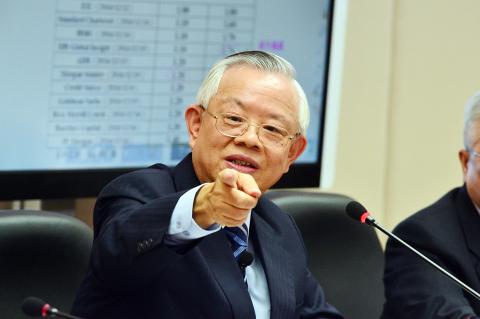The central bank yesterday kept its policy interest rates unchanged for the second consecutive quarter, saying the nation’s economy is experiencing stable growth, but the pace is not fast enough to merit a policy change.
“The board meeting decided to maintain a loose monetary policy stance as uncertainty over the global economy lingers,” Governor Perng Fai-nan (彭淮南) told a news conference in Taipei.
Benign inflation, forecast to rise to between 1 percent and 1.5 percent by different research institutes, means there is no urgency in ending the “status quo,” the central bank said.

Photo: Wang Yi-sung, Taipei Times
The decision means the bank’s discount rate remains at 1.375 percent, the collateralized loan rate at 1.75 percent and the unsecured loan rate at 3.625 percent.
Economists have said the central bank would maintain its rates for at least another six months, allowing the export-focused economy more room to recover from the slowdown in China and a mixed showing in the eurozone.
Mega Securities Co (兆豐證券) economist Lucas Lee (李志安) said the bank might keep its policy rates unchanged in the first half of next year because it needs time to judge US president-elect Donald Trump’s effect on the global economy.
“If Trump pushes for infrastructure investment, this will drive US economic growth, which in the short term would benefit the global economy,” Perng said.
However, Perng voiced concern over political uncertainty and growing protectionism.
Taiwanese trade would be damaged if the US adopts protectionist policies, he said.
Income gaps have widened amid the trend of globalization and several nations, notably the US, have indicated adjustment plans, but a reverse course might do more harm than good and Taiwan would suffer seriously given its deep participation in the global supply chain, he said.
As domestic companies have turned from capital-seekers to suppliers over the years, slowing business activity has created more idle funds and the central bank urged the government to use the nation’s excess savings to fund public construction works.
As of September, the life insurance industry had investment funds valued at NT$19 trillion (US$593 billion), with only NT$200.4 billion being used for special and public construction projects, Perng said, adding that assorted pension funds have another NT$3.9 trillion funds that should be better utilized.

In Italy’s storied gold-making hubs, jewelers are reworking their designs to trim gold content as they race to blunt the effect of record prices and appeal to shoppers watching their budgets. Gold prices hit a record high on Thursday, surging near US$5,600 an ounce, more than double a year ago as geopolitical concerns and jitters over trade pushed investors toward the safe-haven asset. The rally is putting undue pressure on small artisans as they face mounting demands from customers, including international brands, to produce cheaper items, from signature pieces to wedding rings, according to interviews with four independent jewelers in Italy’s main

Japanese Prime Minister Sanae Takaichi has talked up the benefits of a weaker yen in a campaign speech, adopting a tone at odds with her finance ministry, which has refused to rule out any options to counter excessive foreign exchange volatility. Takaichi later softened her stance, saying she did not have a preference for the yen’s direction. “People say the weak yen is bad right now, but for export industries, it’s a major opportunity,” Takaichi said on Saturday at a rally for Liberal Democratic Party candidate Daishiro Yamagiwa in Kanagawa Prefecture ahead of a snap election on Sunday. “Whether it’s selling food or

CONCERNS: Tech companies investing in AI businesses that purchase their products have raised questions among investors that they are artificially propping up demand Nvidia Corp chief executive officer Jensen Huang (黃仁勳) on Saturday said that the company would be participating in OpenAI’s latest funding round, describing it as potentially “the largest investment we’ve ever made.” “We will invest a great deal of money,” Huang told reporters while visiting Taipei. “I believe in OpenAI. The work that they do is incredible. They’re one of the most consequential companies of our time.” Huang did not say exactly how much Nvidia might contribute, but described the investment as “huge.” “Let Sam announce how much he’s going to raise — it’s for him to decide,” Huang said, referring to OpenAI

The global server market is expected to grow 12.8 percent annually this year, with artificial intelligence (AI) servers projected to account for 16.5 percent, driven by continued investment in AI infrastructure by major cloud service providers (CSPs), market researcher TrendForce Corp (集邦科技) said yesterday. Global AI server shipments this year are expected to increase 28 percent year-on-year to more than 2.7 million units, driven by sustained demand from CSPs and government sovereign cloud projects, TrendForce analyst Frank Kung (龔明德) told the Taipei Times. Demand for GPU-based AI servers, including Nvidia Corp’s GB and Vera Rubin rack systems, is expected to remain high,